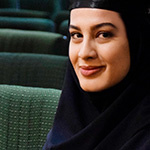The Time Museum of Tehran is a magnificent mansion in the north of the capital of Iran, which is located on Zafaraniyeh Street.
The construction of this mansion back to the time of Mohammad Shah and Naser al-Din Shah Qajar. The mansion is in fact a historical house which is also known as the House of Hossain Khodadad, Clock Museum, and Time Museum.
The building of Time Museum has been erected in an area of five hectares and the built-up area of the building is 700 square meters. Currently, it includes two stories, although it was a one-floor building at the time of its construction. The building was bought by a person, named Hossain Khodadad, in 1963, who was a craftsman and entrepreneur.
The museum's timing tools are displayed in a number of sections, including clocks, mechanical watches pocket watches (pocket and wrist), and time-measuring tools.
You can have a different journey in history at the Time Museum. This different journey begins exactly when you take a step into the Time Museum Garden.
The museum is in a garden that gives you an interesting space. Before entering the museum building, you can see the following objects Sundial Clocks, Oil Clocks, Rope Clocks, Dragon Boat, Water Clocks.

Indoor attractions of Time Museum
Take a step into the large first-floor lounge and take a look at the clocks made from the 17th to the 20th century. Here you will find mechanical weight clocks, and you will find examples such as pendulum, desktop, wall, and standing clocks.
Worthy of mention is that the building is registered as one of the great national masterpieces of Iranian architecture. The building’s façade and plasterwork are a mixture of Iranian and European styles.

The clocks have been artfully decorated, indicating the importance of clock decorations in the past.
Some of these clocks were gifts received by political men during their travels to other countries, and others were personal belongings.
Moreover, in the museum, there are many clocks and watches which are collected from the seventeenth to the twentieth centuries. Besides Iran, some of these clocks also collected from countries like England, France, Switzerland, and Germany.

Another interesting thing of this part is a bronze clock made in France that has gold cover. This clock is a type of shelf or desktop clock and belongs to the 5th century.

A figure of Homer - the epic poet of the Greek - is on this clock and is adorned in the style of Louis XVI.

Of course, not everything ends in clocks; when you raise your head a little and look at the ceiling, you will be obsessed with its design and forget about the time.

Esfahani Room
Hossein Khodadad's love for Iranian art did not end with artistic plaster. He chose a special room in the building and asked the masters to design it differently from other parts of the building.

There is a kind of plaster in this room in which deep shapes are created in the shape of plaster containers. It is inspired by the music room of Ali Qapu Palace of Isfahan and other Safavid monuments.

The ceiling of this room is also adorned by the design of the Isfahan carpet and the masters have used brick designs to make the roof.

Celebrities' watches
One of the fascinating parts of the museum is the collection of watches of celebrities who have been donated to the museum by themselves.

In this section, you will find donations from people such as Jamshid Mashayekhi, Mohammad Ali Keshavarz, Ehteram Boroumand, Davood Rashidi, Aminollah Rashidi, Mostafa Rahmandoust, Dr. Hassabi, Dr. Parviz Kordvani, Shahid Avini, Shahid Mehdi Bakeri and ...

Compiled by Marzieh Rahmani


























Your Comment